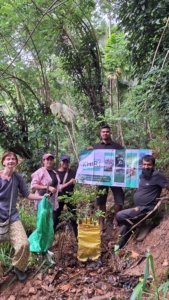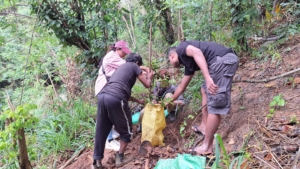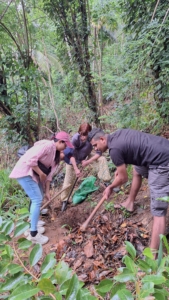Kandyan Forest Gardens: A Legacy of Biodiversity and Sustainability
This three-year project aims to restore a previously deforested acre of land, now secured by the Forest Healing Foundation (FHF), to ensure its long-term protection and ecological integrity. Kandyan Forest Gardens are traditional agroforestry systems in Sri Lanka’s central highlands, mimicking natural forests and representing sustainable land use through diverse native, fruit, spice, and medicinal plants.
Their importance for conservation and sustainability is comprehensive:
- Biodiversity Hotspot: The project area is within a global biodiversity hotspot and a crucial habitat for 62 bird species (15 endemic), along with diverse mammals and reptiles, including endangered toque macaques and the critically endangered great forest gecko.
- Ecological Balance & Soil Health: These gardens promote ecological balance, enhance soil fertility, and are crucial for water conservation. They also prevent carbon loss by reducing soil erosion and maintaining soil health.
- Community Livelihoods: Kandyan Forest Gardens provide essential food, medicine, and income streams to rural households. The project will directly employ two local villagers and a supervisor for tree planting, monitoring, and nursing during the initial three years, ensuring direct community benefit.
- Climate Resilience: Their multi-layered vegetation structure is critical for carbon sequestration, with well-maintained gardens capable of sequestering 35-100 megagrams of carbon per hectare. They serve as a natural defense against climate volatility.
Empowering Communities Through Engagement and Research
A fundamental aspect of this project is significant involvement from the local community, who are at the heart of our operations. The Forest Healing Foundation team, comprised of local villagers, will lead the tree planting, monitoring, and ongoing care. The project will also serve as an invaluable platform for workshops and educational programs with local schools and the village youth club, fostering a deep understanding and appreciation for conservation. This collaborative approach empowers them to become dedicated ambassadors for these invaluable forest ecosystems.
Furthermore, we will collaborate closely with the University of Peradeniya to conduct crucial research, including biodiversity assessments and carbon capture measurements.
We are committed to ongoing monitoring, with a follow-up visit planned in approximately six months. We eagerly anticipate sharing further advancements as this vital reforestation effort continues to secure a more sustainable and biodiverse future for Sri Lanka’s Kandyan region.
Update: 21st July 2025
Our Khiri Reach team recently visited the project site in Wepathana village, Digana, Central Province. Despite challenging weather, we proceeded with the essential planting process. We met Nel, the project’s lead coordinator, and planted a Ma-Dan tree (Syzygium cumini), a fruit tree selected for its ability to enhance soil quality and contribute significantly to the local ecosystem. We were pleased to support Nel and Athula, a dedicated team employed by the foundation, in this foundational effort.






